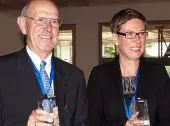Germany – A cutting-edge pilot concept for the recovery of raw materials, conceived by Münster University Professors Bernhard Gallenkemper and Sabine Flamme in Germany, has been rewarded with the Urban Mining Award 2012 in the Science and Recycling category. The winning concept takes into account the entire product cycle and seeks to pinpoint man-made reservoirs and their respective potential value for recyclability.
 The work centres on a distinction between so-called short-term urban mines – including packaging and small electrical appliances – and long-term mines such as large infrastructure items and buildings. Professor Flamme states: ‘Proper identification of these anthropogenic deposits and a detailed quantification of the secondary raw materials they contain are integral elements to managing these sites.’
The work centres on a distinction between so-called short-term urban mines – including packaging and small electrical appliances – and long-term mines such as large infrastructure items and buildings. Professor Flamme states: ‘Proper identification of these anthropogenic deposits and a detailed quantification of the secondary raw materials they contain are integral elements to managing these sites.’
According to the team from Münster University’s Department of Civil Engineering, the research project was launched because of the strong need to ‘generate adequate procedures’ to help secure the industry’s key raw materials in the face of today’s significant shortages.
Labelling Germany as a ‘resource-poor country’, Professor Flamme argues that future advancements in this area will have a far-reaching impact on the nation’s market. ‘A specific exception is our durables sector, which shows we are currently still maintaining a reasonable stock,’ she notes. ‘However, it is of utmost importance to map out information in the planning stages of these goods in order to gain insight of the resources that are at our disposal.’
Only an intelligent approach like this will help reach optimal resource utilisation, emphasises Professor Gallenkemper. He is pleased to see that the on-going scarcity of raw materials has finally made the industry take selective demolition and the use of intelligent recovery strategies seriously. He states: ‘Back in the early 90s, comparable research and projects were mainly fuelled by the prevailing cost-effective mentality of disposal – which meant searching for the cheapest methods while targeted, high-quality restoration treatment procedures were mocked.’
With this recognition from the Urban Mining Association and increasing calls for sustainable environmental development on their side, Dr Gallenkemper and Dr Flamme comment: ‘Through a combination of politics and business, supported by appropriate research projects, including construction quality, the circular economy certainly is a reality.’
Don't hesitate to contact us to share your input and ideas. Subscribe to the magazine or (free) newsletter.


